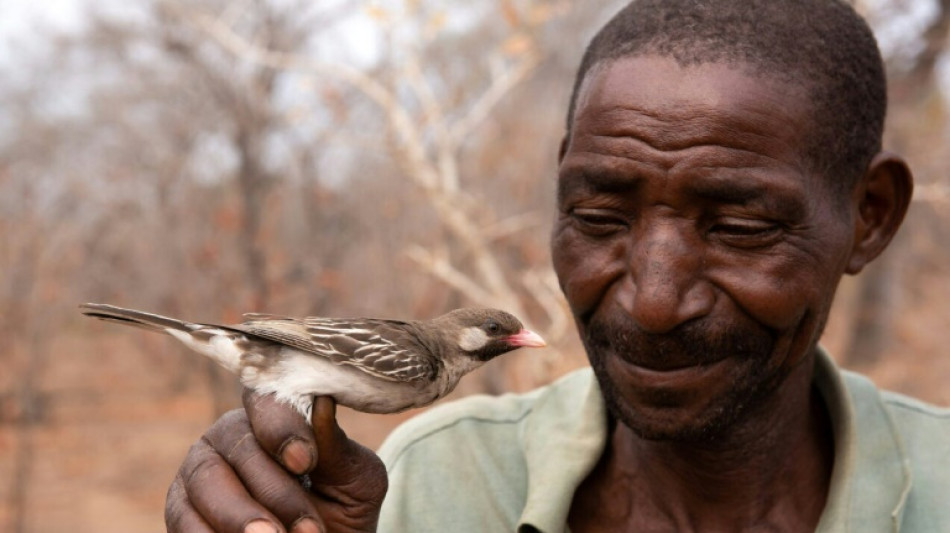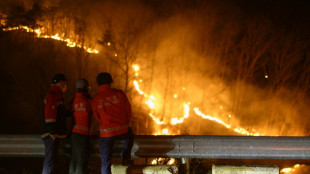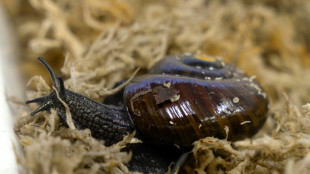
-
 British Airways owner unveils big Boeing, Airbus order
British Airways owner unveils big Boeing, Airbus order
-
IPL suspended for one week over India-Pakistan conflict

-
 Slot says all at Liverpool sad to see Alexander-Arnold go
Slot says all at Liverpool sad to see Alexander-Arnold go
-
Leo XIV celebrates first mass as pope in Sistine Chapel

-
 India says repulsed fresh Pakistan attacks as death toll climbs
India says repulsed fresh Pakistan attacks as death toll climbs
-
Japan's Panasonic targets 10,000 job cuts worldwide

-
 Putin evokes WWII victory to rally Russia behind Ukraine offensive
Putin evokes WWII victory to rally Russia behind Ukraine offensive
-
China exports beat forecasts ahead of US tariff talks

-
 Leo XIV, the 'Latin Yankee', to celebrate first mass as pope
Leo XIV, the 'Latin Yankee', to celebrate first mass as pope
-
Most stocks lifted by hopes for US-China talks after UK deal

-
 IPL suspended indefinitely over India-Pakistan conflict: reports
IPL suspended indefinitely over India-Pakistan conflict: reports
-
German lender Commerzbank's profits jump as it fends off UniCredit

-
 Rare bone-eroding disease ruining lives in Kenya's poorest county
Rare bone-eroding disease ruining lives in Kenya's poorest county
-
India says repulsed fresh Pakistan attacks as de-escalation efforts grow

-
 Zhao's historic snooker title sparks talk of China world domination
Zhao's historic snooker title sparks talk of China world domination
-
'High expectations': EU looks to Merz for boost in tough times

-
 Poisoned guests rarely invited before deadly mushroom lunch, Australia trial hears
Poisoned guests rarely invited before deadly mushroom lunch, Australia trial hears
-
China sales to US slump even as exports beat forecasts

-
 Indian cricket to make 'final decision' on IPL over Pakistan conflict
Indian cricket to make 'final decision' on IPL over Pakistan conflict
-
Dethroned Bundesliga champions Leverkusen face uncertain future

-
 China can play hardball at looming trade talks with US: analysts
China can play hardball at looming trade talks with US: analysts
-
French monuments in trouble while PSG prepare for Champions League final

-
 Newcastle face Chelsea in top five showdown, Alexander-Arnold in spotlight
Newcastle face Chelsea in top five showdown, Alexander-Arnold in spotlight
-
Flick's Barca must show 'hunger' in crunch Liga Clasico

-
 Clasico the last chance saloon for Ancelotti's Real Madrid
Clasico the last chance saloon for Ancelotti's Real Madrid
-
Timberwolves overpower Warriors to level series

-
 Chinese fabric exporters anxious for US trade patch-up
Chinese fabric exporters anxious for US trade patch-up
-
Putin gears up to host world leaders at lavish army parade

-
 Nearing 100, Malaysian ex-PM Mahathir blasts 'old world' Trump
Nearing 100, Malaysian ex-PM Mahathir blasts 'old world' Trump
-
Leo XIV, first US pope, to celebrate first mass as pontiff

-
 Asian stocks lifted by hopes for US-China talks after UK deal
Asian stocks lifted by hopes for US-China talks after UK deal
-
Former head of crypto platform Celsius sentenced 12 years

-
 Ex-model testifies in NY court that Weinstein assaulted her at 16
Ex-model testifies in NY court that Weinstein assaulted her at 16
-
Amphastar Pharmaceuticals to Present at the 2025 Bank of America Health Care Conference

-
 Ascendant Resources Announces Closing of Second and Final Tranche of Non-Brokered Private Placement
Ascendant Resources Announces Closing of Second and Final Tranche of Non-Brokered Private Placement
-
Nestlé and OMP Showcase Approach to Future-Ready Supply Chain at Gartner Supply Chain Symposium/Xpo in Barcelona

-
 Genflow Biosciences PLC Announces Share Subscription, Director's Dealing and Update
Genflow Biosciences PLC Announces Share Subscription, Director's Dealing and Update
-
Argo Blockchain PLC Announces 2024 Annual Results and Restoration of Listing

-
 'Great honor': world leaders welcome first US pope
'Great honor': world leaders welcome first US pope
-
Pacquiao to un-retire and fight Barrios for welterweight title: report

-
 Trump unveils UK trade deal, first since tariff blitz
Trump unveils UK trade deal, first since tariff blitz
-
Man Utd one step away from Europa League glory despite horror season

-
 Jeeno shines on greens to grab LPGA lead at Liberty National
Jeeno shines on greens to grab LPGA lead at Liberty National
-
Mitchell fires PGA career-low 61 to grab Truist lead

-
 AI tool uses selfies to predict biological age and cancer survival
AI tool uses selfies to predict biological age and cancer survival
-
Extremely online new pope unafraid to talk politics

-
 Postecoglou hits back as Spurs reach Europa League final
Postecoglou hits back as Spurs reach Europa League final
-
Chelsea ease into Conference League final against Betis

-
 Pope Leo XIV: Soft-spoken American spent decades amid poor in Peru
Pope Leo XIV: Soft-spoken American spent decades amid poor in Peru
-
First US pope shared articles critical of Trump, Vance


Wild birds analyze grunts, whistles made by human honey-hunters
In parts of Africa, expert honey-hunters call out to a species of bird known as the greater honeyguide, which leads them to wild bee nests -- a mutually beneficial practice.
In a new study published Thursday in Science, researchers have found that honeyguide birds in Tanzania and Mozambique distinguish between honey-hunters' calls, responding more readily to signals used in their local area.
"The assignment of meaning to arbitrary or semi-arbitrary sounds is one of the features that characterizes human language," joint lead author Claire Spottiswoode, an evolutionary biologist at the University of Cambridge, told AFP.
The new research shows this phenomenon "extends to our interactions with other species, showing how continuous we really are with the rest of the natural world."
The Hadza, a group of hunter-gatherers in northern Tanzania, use a melodic whistle to initiate a partnership with honeyguides, while the Yao people of Mozambique use a trill followed by a grunt that sounds like "brrr-hmm!"
Once a nest is found, the humans crack it open, harvesting the honey and bee larvae, while the birds feast on the exposed beeswax.
Using mathematical models and audio playback, Spottiswoode and her co-author Brian Wood, a UCLA anthropologist, studied these signals, how helpful they were for people, and their effects on the birds.
They found the honeyguide birds of Tanzania were more than three times more likely to cooperate after hearing local Hadza whistles compared to "foreign" Yao calls.
Conversely, the honeyguides of Mozambique were almost twice as likely to seek a partnership after hearing a Yao trill-grunt than a foreign Hadza whistle.
The authors called this an example of "cultural coevolution," with humans of an area more likely to be successful if they stick to the local tradition, just as the birds of that region keep their ears out for the specific local call.
As for why such stark differences arose between the communities, practical considerations may be at play.
The Hadza hunt mammals using bows and arrows, and using a bird-like whistle reduces the chances of frightening away the other prey they are also after.
The Yao, meanwhile, don't hunt mammals and their trill-grunt might be a good way of scaring off elephants or buffaloes whom they don't wish to startle in a close encounter.
"Not just among the Hadza, but in hunting cultures around the world, people use whistles as a form of encrypted communication -- to share information while avoiding detection by prey," Wood said.
- A dying practice -
How exactly honeyguides learn localized human calls is an area for future study.
Perhaps they watch and copy the behavior of older birds, or perhaps they form positive associations between the human signal and a reward.
Nor is it known just how far this partnership goes back.
Our pre-Homo sapien ancestors acquired mastery of fire and stone tools between 1.5 - 3 million years ago, respectively, and so "it's plausible that this relationship could be really ancient," said Spottiswoode.
It wasn't until a seminal study published in 1989 that the scientific world was convinced the honeyguide-honey hunter relationship was real, not just a folktale or superstition.
But the practice is slowly dying out, partly as a result of changes in the way people obtain sweet food, and partly because people are prevented from interacting with honeyguides in protected nature parks.
"The birds still call to us, but we don't necessarily follow them," said Spottiswoode.
"We should really treasure these remaining places where the relationship still thrives and where this rich interspecies culture still exists."
H.E.Young--AMWN



